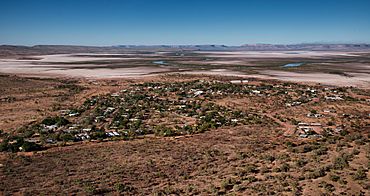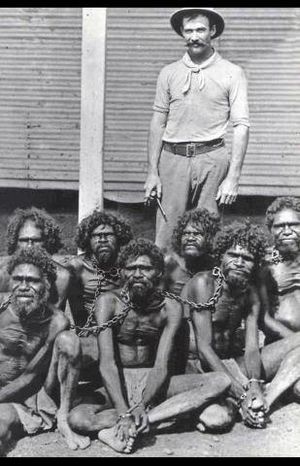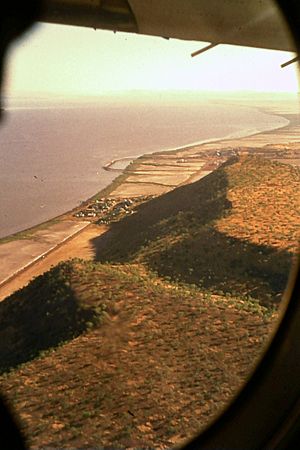Wyndham, Western Australia facts for kids
Quick facts for kids WyndhamWestern Australia |
|||||||||
|---|---|---|---|---|---|---|---|---|---|

Wyndham's Three Mile area, looking south to the King River
|
|||||||||
| Established | 1886 | ||||||||
| Postcode(s) | 6740 | ||||||||
| Elevation | 11 m (36 ft) | ||||||||
| Area | [convert: needs a number] | ||||||||
| Location | |||||||||
| LGA(s) | Shire of Wyndham-East Kimberley | ||||||||
| State electorate(s) | Kimberley | ||||||||
| Federal Division(s) | Durack | ||||||||
|
|||||||||
Wyndham is a town located in the far north of Western Australia. It's part of the Kimberley region. The town is about 3,315 kilometres (2,060 miles) northeast of Perth.
Wyndham was started in 1886. It was built to support a new goldfield nearby at Halls Creek. Today, Wyndham is an important port and service hub for the eastern Kimberley area. In 2021, its population was 941 people. More than half of the people living there, about 54%, are Aboriginal and Torres Strait Islander.
Wyndham has two main parts. The first is the original town site, called Wyndham Port. It sits on Cambridge Gulf. About 5 kilometres (3 miles) south by road is the Three Mile area. This part has homes and shops for the people who work at the port. Both areas were founded in 1886. Wyndham is part of the Shire of Wyndham-East Kimberley.
Contents
Wyndham's Past: A Gold Rush Town
The land where Wyndham is built belongs to the traditional Doolboong people.
The first European to visit this area was Phillip Parker King in 1819. He was looking for a river that could lead inland. He sailed into Cambridge Gulf and then up a river, which was later named after him. He didn't find fresh water, so he left.
Wyndham was officially started on April 14, 1886. Charles Danvers Price, a government official, led a group to set up the town. He chose the name Wyndham after Walter George Wyndham. Walter was the stepson of the governor of Western Australia at the time, Sir Frederick Napier Broome.
By late 1886, the town was growing very fast. There were three hotels at the port and two taverns at the Three Mile Camp. Many other businesses also opened, like stores, butcher shops, and billiard rooms. Ships brought in thousands of miners. These miners were heading to the Halls Creek goldfields. Sometimes, up to 16 ships were in Cambridge Gulf at once.
However, the gold rush at Halls Creek ended by 1888. Wyndham's importance then decreased. It became a small settlement that mainly served the cattle stations in the East Kimberley. By 1912, there was very little money in Wyndham. People often paid for things using special notes called "shinplasters."
During World War II, in 1942, Japanese aircraft attacked Wyndham and its airport four times.
Wyndham became important again in the early 1960s. It helped with building the Ord River Diversion Dam and the town of Kununurra. As Kununurra grew bigger, Wyndham's role as a service centre became less important by the 1980s. However, Wyndham has become important again as a port. New mines now ship their ore from Wyndham's port.
Wyndham Meatworks: A Key Industry
In 1913, the Western Australian government began building the Wyndham Meatworks. This was done to help the town's economy grow again. The construction was stopped for a while due to World War I. But the meatworks were finished in 1919.
The meatworks were the main source of jobs and income for Wyndham. They operated until they closed in 1985. The town also supported the Air Beef Scheme. This scheme flew beef out of the region from 1947 to 1965.
Wyndham's Location and Nature
Wyndham is located on the eastern side of Cambridge Gulf. This gulf is an inlet of Joseph Bonaparte Gulf in the Timor Sea. Several rivers surround the town to the south, including the Durack, Pentecost, and King rivers. The Forrest River is to the west, and the Ord River is to the north.
Much of the land around Wyndham is rugged. It includes the Bastion Range and the muddy areas of the Cambridge Gulf. The Bastion Range is home to the Wyndham Important Bird Area. This area is 28 square kilometres (11 square miles) in size. It is important because it has the largest known group of endangered Gouldian finches.
Wyndham's Climate: Hot and Humid
Wyndham has a hot semi-arid climate. This means it's a bit too dry to be a tropical savanna climate. It has a wet season from late November to March. The dry season lasts from April to early November.
November is the hottest month. The average high temperature is 39.5°C (103.1°F). June is the coolest month, with an average high of 31.0°C (87.8°F). The average yearly high temperature is 35.6°C (96.1°F). This is one of the highest in Australia. In 1946, Wyndham had 333 days in a row where the temperature was over 32°C (89.6°F).
The wet season is very humid. In February, the average dewpoint temperature is 22.4°C (72.3°F). In the dry season, in August, it's 8.3°C (46.9°F).
Wyndham can get a lot of rain at once. For example, on March 4, 1919, 317.5 millimetres (12.5 inches) of rain fell in 24 hours. The next day, another 116.8 millimetres (4.6 inches) fell.
| Climate data for Wyndham Aero, elevation 4 m (13 ft), (2000–2020 normals, extremes 2000–present) | |||||||||||||
|---|---|---|---|---|---|---|---|---|---|---|---|---|---|
| Month | Jan | Feb | Mar | Apr | May | Jun | Jul | Aug | Sep | Oct | Nov | Dec | Year |
| Record high °C (°F) | 44.0 (111.2) |
43.2 (109.8) |
43.9 (111.0) |
41.4 (106.5) |
39.4 (102.9) |
37.3 (99.1) |
38.1 (100.6) |
39.7 (103.5) |
42.0 (107.6) |
45.1 (113.2) |
44.9 (112.8) |
45.8 (114.4) |
45.8 (114.4) |
| Mean daily maximum °C (°F) | 36.4 (97.5) |
36.1 (97.0) |
36.3 (97.3) |
36.9 (98.4) |
34.1 (93.4) |
31.5 (88.7) |
32.1 (89.8) |
34.0 (93.2) |
37.8 (100.0) |
39.6 (103.3) |
40.0 (104.0) |
38.1 (100.6) |
36.1 (96.9) |
| Mean daily minimum °C (°F) | 26.2 (79.2) |
26.0 (78.8) |
25.7 (78.3) |
23.5 (74.3) |
19.2 (66.6) |
15.9 (60.6) |
15.3 (59.5) |
16.1 (61.0) |
21.5 (70.7) |
24.8 (76.6) |
26.7 (80.1) |
26.7 (80.1) |
22.3 (72.2) |
| Record low °C (°F) | 20.9 (69.6) |
21.7 (71.1) |
19.0 (66.2) |
13.8 (56.8) |
8.9 (48.0) |
6.0 (42.8) |
5.1 (41.2) |
7.4 (45.3) |
10.7 (51.3) |
15.5 (59.9) |
18.4 (65.1) |
21.0 (69.8) |
5.1 (41.2) |
| Average rainfall mm (inches) | 218.2 (8.59) |
221.3 (8.71) |
140.3 (5.52) |
29.0 (1.14) |
11.5 (0.45) |
5.3 (0.21) |
0.2 (0.01) |
0.0 (0.0) |
1.0 (0.04) |
20.3 (0.80) |
56.8 (2.24) |
199.7 (7.86) |
903.6 (35.57) |
| Average rainy days (≥ 1.0 mm) | 13.4 | 12.1 | 8.6 | 2.0 | 1.0 | 0.5 | 0.1 | 0.0 | 0.3 | 1.7 | 5.0 | 10.7 | 55.4 |
| Source: Australian Bureau of Meteorology | |||||||||||||
Life in Wyndham: Schools and Community
Education in Wyndham
Wyndham has two schools for children. These are Wyndham District High School, which teaches students from Kindergarten to Year 12. There is also St Joseph's Catholic School, for Kindergarten to Year 7. For older students, there is a TAFE campus. There is also a daycare centre for younger children.
Getting Around: Transport
Wyndham has its own airport, called Wyndham Airport.
Community Places
The Wyndham Memorial Swimming Pool is a public pool. It opened on November 5, 1966.
The Ted Birch Memorial Youth and Recreation Centre is a place for community activities. It was first called the Wyndham Recreation Centre. It opened on October 11, 2003. The centre was renamed on May 29, 2014. This was to honour Pastor Edward "Ted" Birch. He helped start a youth service in Wyndham.
The Peter Reid Memorial Hall is a community hall. People can use it for events and private bookings. The hall was built in 1982. It was later renamed to remember Peter Reid. He helped the community a lot.
The Wyndham Port Shire Hall is an old building with a lot of history. It was built in 1960. It stands on the foundations of the first school and road board buildings from 1894. The hall was once an office for the local government. Later, it became a recreation space. In 1997, it was turned into an art gallery. It was known as the Boab Art Gallery. It showed art by local artists. Now, a community group uses the hall. They work to protect the Gouldian finch, a rare bird found near Wyndham. The hall is also part of a historical walk around Wyndham Port.
Wyndham is also famous for the Big Crocodile. This is a large statue of a crocodile. It is made of wire and concrete and is about 18 metres (59 feet) long.
Things to Do: Tourism
For visitors, Wyndham has two hotels and a caravan park. The nearby Bastion lookout offers amazing views. You can see the surrounding rivers, like the Durack, Pentecost, King, Forrest, and Ord River. These rivers flow into the Cambridge Gulf.
The town has a museum in the old courthouse. It is open to the public and run by the Wyndham Historical Society. Close to Wyndham is the Boab Prison Tree.
Jirrawun Arts: Indigenous Art Centre
Jirrawun Arts was an Indigenous Australian art centre. It started in 1998 in Kununurra. In 2006, it moved to Wyndham. It was well-known as a place for modern Indigenous Australian artists. These artists were from the eastern Kimberley region. Famous artists like Paddy Bedford and Freddie Timms were part of it. The centre closed in 2010. Their art was shown in exhibitions in Melbourne and other places.
 | Jackie Robinson |
 | Jack Johnson |
 | Althea Gibson |
 | Arthur Ashe |
 | Muhammad Ali |




